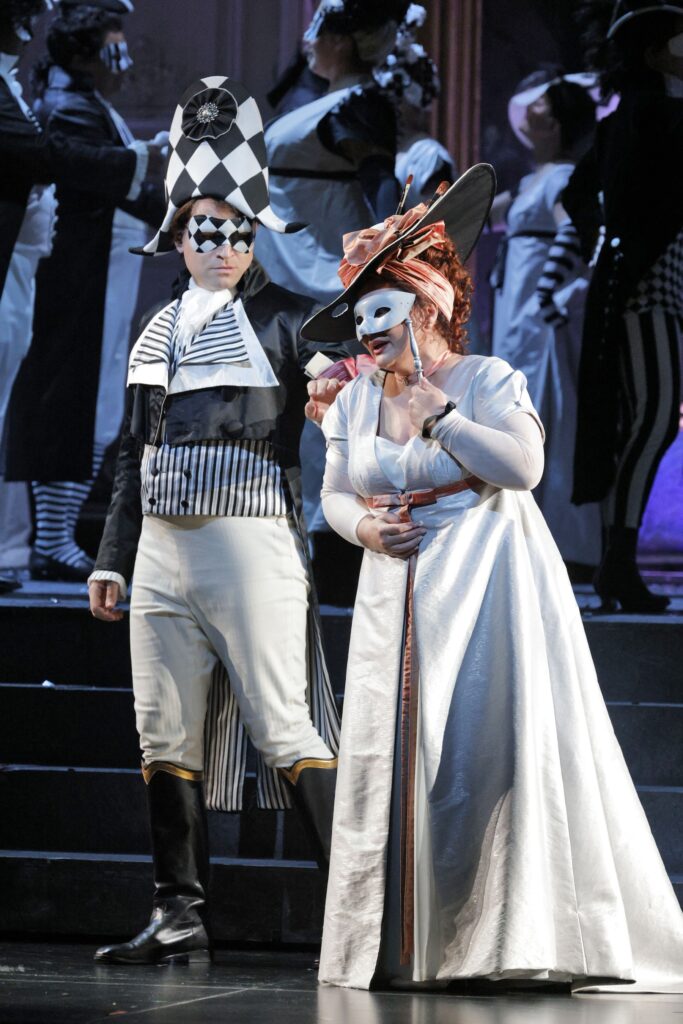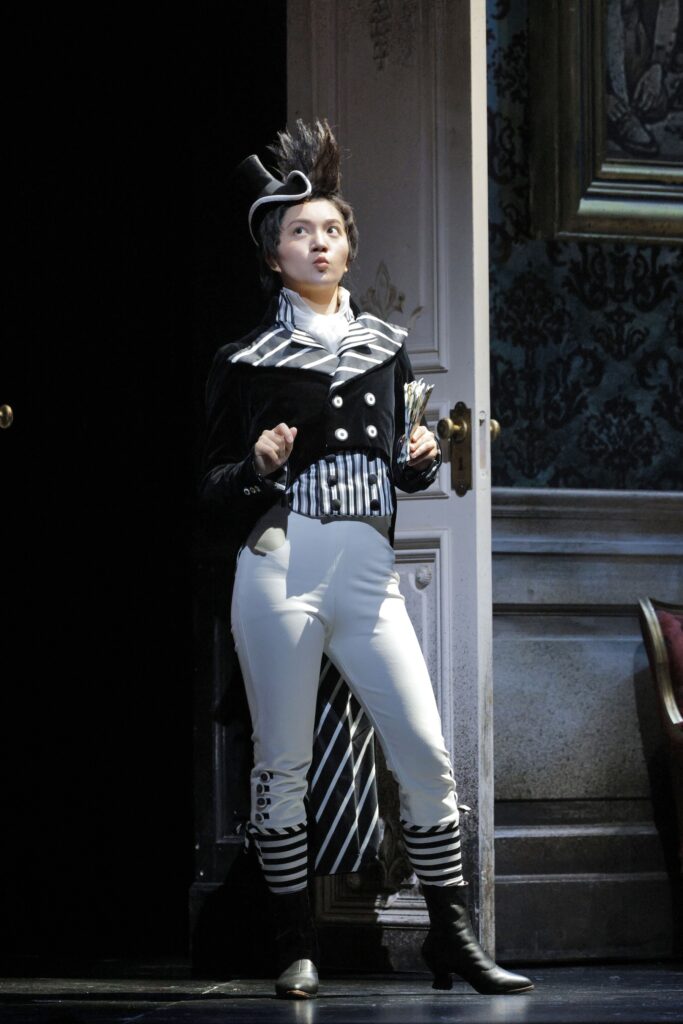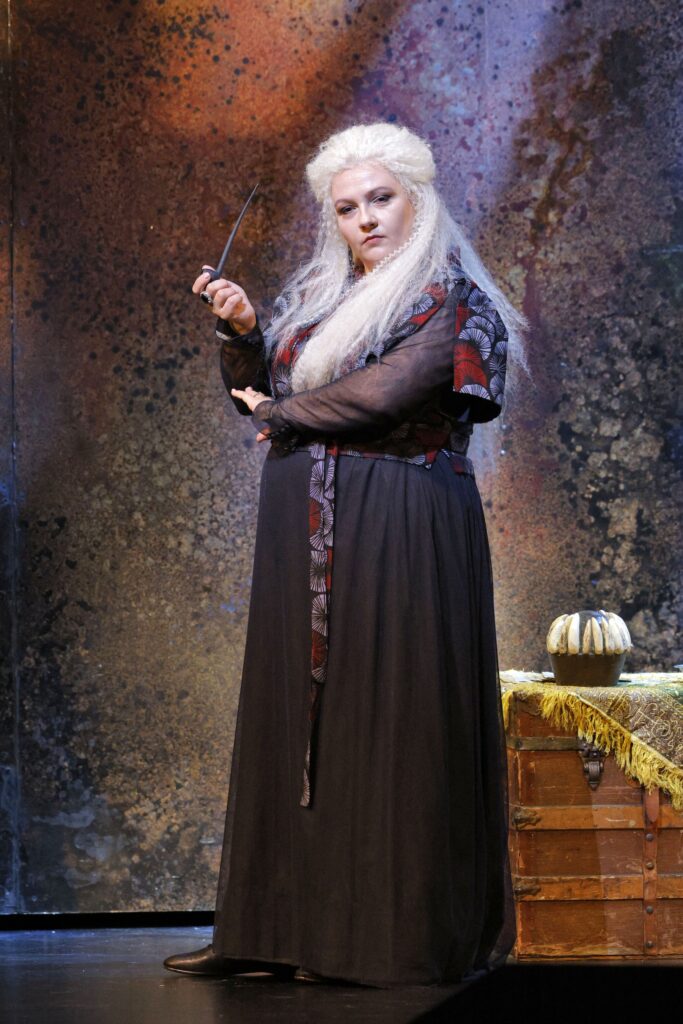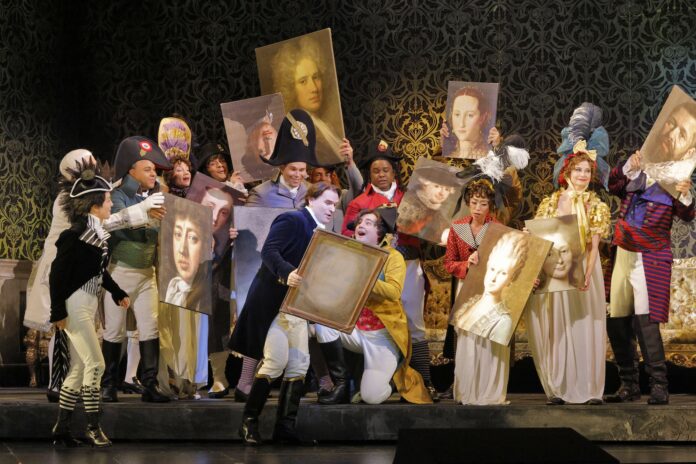These days, it’s hard to take a public apology at face value. It’s all too common for mea culpas to be made without the one apologizing feeling any real contrition. They aren’t sorry for what they did, just that they got caught. That’s why the South African owner of Twitter is surprised to find people calling him out for joking about assassinating Joe Biden. It’s why Hollywood megastars wonder why Kevin Spacey and Roman Polanski can’t work like they used to. In each scenario, none of the guilty parties is actually begging forgiveness, just hoping that people forget so that things can return to some form of “normal” (which I find morbidly amusing 4 and a half years into a global pandemic everyone’s ignoring).
Debate continues about the intentions of the dramatized version of King Gustav III, as seen in Verdi’s Un Ballo in Maschera–The Masked Ball (through September 27 at the War Memorial Opera House, SF). Is he truly contrite for knowingly entering into an affair with a married woman? Does knowing of impending danger make him more accepting of the consequences? Or was he putting on a front, even to himself? Verdi seems to think the former.

In this version, King Gustav (US tenor Michael Fabiano) is beloved by his people, save for a few conspirators who seek to overthrow him. Keeping those would-be traitors at bay is the loyalty of soldiers like Oscar (Chinese soprano Mei Gui Zhang) and Renato (Mongolian baritone Amartuvshin Enkhbat). The latter causes a bit of a wrinkle because Gustav is having an affair with Renato’s wife, Amelia (Armenian soprano Lianna Haroutounian). When Gustav’s official duties inform him about the popular-if-Satanic palm-reader Ulrica (Romanian mezzo Judit Kutasi), the king decides to don the clothes of a commoner and have his palm read personally.
What Gustav learns is unsettling: Ulrica tells him that he will soon be murdered by the next person to shake his hand. Gustav tries to laugh off this prediction by having one of his subjects shake his hand in full view of Ulrica. The only one to take him up on the offer is Renato. Thus begins a course of action that will have dire consequences for all three members of this secret love triangle. As one would guess, the point of no return will occur at the king’s upcoming masked ball.

Side note: It’s worth noting that the casting of Zhang as Oscar is still a bit eyebrow-raising, even if the decision to write the character as a soprano “trouser role” was made more than 160 years ago. Zhang is an excellent vocalist and well embodies the officer’s jovial nature. Yet the historical King Gustav III was thought to be gay. This was not only known to Verdi and librettist Antonio Somma, but it’s something an earlier version of the story tried to make explicit before they nixed the idea.*
In any case, all assembled take to their characters well. With such high emotion at play, it’s easy to forget that Un Ballo in Maschera is relatively light opera. Perhaps not as whimsical as The Magic Flute, but not as intimidating to opera newbies as Wagner. With that in mind, the star of the show is Kutasi, who is clearly enjoying herself as palm-reader Ulrica. Adorned in curly white wig and dark cloth, Ulrica is practically in a story all her own, a version of the Greek Cassandra in which she plays the eponymous lead. Kutasi appears in only one scene (two, if you count a sort of cameo at the climax), but leaves the most lasting impression; which is saying something, given her fellow talented co-stars.
Equally notable is conductor Eun Sun Kim, who once again spends the overture energetically reveling in the (for lack of a better term) “athleticism” of the composition. Even at the quieter moments, she makes sure that her orchestra is wide awake and ever present, not unlike the danger Gustav is avoiding ahead of the masked ball.

Speaking of which, one would be remiss not to mention the fine work of Italian costumer Silvia Aymonino. It takes subtle approaches (the conspirators standing out from the rest of the soldiers) and more pointed statements (once revealed, Amelia wears an almost virginal white dress) before the designer goes wild during the titular ball. The collection of blinding bright colors and domino masks makes the preceding costumes seem almost monochromatic by comparison. The stand out all the more against Federica Parolini’s sets, which are often long shadows cast against walls that seem to never end.
Help us save local journalism!
Every tax-deductible donation helps us grow to cover the issues that mean the most to our community. Become a 48 Hills Hero and support the only daily progressive news source in the Bay Area.
Since I was watching the SF Opera livestream of the show, CO² levels weren’t a concern (though the Opera House has always had great HVAC). Still, I don’t recall seeing very many masks amongst audience members during crowd shots. Fortunately, that wasn’t something I had to worry about in-person.
Un Ballo in Maschera is an entertaining way for SF Opera to begin the new season that simultaneously began with The Handmaid’s Tale (which I’ve yet to see, as of this writing). Yet, one considers the casting of Oscar as an unnecessary compromise to prudish interests; the same prudes who would most likely kvetch about the casting of Asian performers at all. It’s a shame that the question was removed, even if it takes nothing away from the great work done by all involved.
UN BALLO IN MASCHERA runs through September 27 at the War Memorial Opera House, SF. Tickets and further info here.
*This review has been edited to clarify the nature of the Oscar role.




